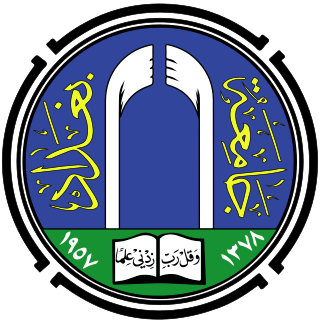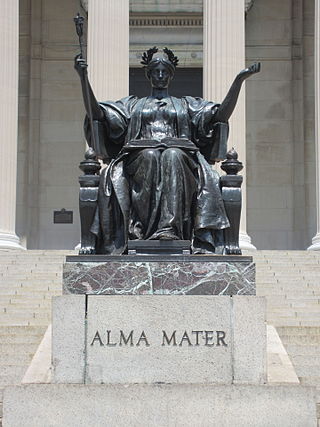Political science is the scientific study of politics. It is a social science dealing with systems of governance and power, and the analysis of political activities, political institutions, political thought and behavior, and associated constitutions and laws.

SOAS University of London is a public research university in London, England, and a member institution of the federal University of London. Founded in 1916, SOAS is located in the Bloomsbury area of central London.

The Al-Azhar University is a public university in Cairo, Egypt. Associated with Al-Azhar Al-Sharif in Islamic Cairo, it is Egypt's oldest degree-granting university and is renowned as one of the world's most prestigious universities for Islamic learning. In addition to higher education, Al-Azhar oversees a national network of schools with approximately two million students. As of 1996, over 4,000 teaching institutes in Egypt were affiliated with the university.

Cairo University, also known as the Egyptian University from 1908 to 1940, and King Fuad I University and Fu'ād al-Awwal University from 1940 to 1952, is Egypt's premier public university. Its main campus is in Giza, immediately across the Nile from Cairo. It was founded on 21 December 1908; however, after being housed in various parts of Cairo, its faculties, beginning with the Faculty of Arts, were established on its current main campus in Giza in October 1929. It is the second oldest institution of higher education in Egypt after Al-Azhar University, notwithstanding the pre-existing higher professional schools that later became constituent colleges of the university. It was founded and funded as the Egyptian University by a committee of private citizens with royal patronage in 1908 and became a state institution under King Fuad I in 1925. In 1940, four years following his death, the university was renamed King Fuad I University in his honor. It was renamed a second time after the 1952 Egyptian Revolution. The university currently enrolls approximately 155,000 students in 20 faculties and 3 institutions. It counts three Nobel Laureates among its graduates and is one of the 50 largest institutions of higher education in the world by enrollment.

Samford University is a private Baptist university in Homewood, Alabama. It was founded in 1841 as Howard College by Baptists. Samford University describes itself as the 87th oldest institution of higher learning in the United States. The university enrolls 5,683 students from 47 states, 2 U.S. territories, and 19 countries.

United Arab Emirates University (UAEU) (Arabic: جامعة الإمارات العربية المتحدة) is a public research university located in Al Ain, United Arab Emirates. Founded in 1976 by the country's first President, Sheikh Zayed bin Sultan Al Nahyan, it is the oldest university in the United Arab Emirates and offers courses in various subjects up to post-graduation.

Private universities and private colleges are institutions of higher education, not operated, owned, or institutionally funded by governments. They may receive from governments tax breaks, public student loans, and grants. Depending on their location, private universities may be subject to government regulation. Private universities may be contrasted with public universities and national universities. Many private universities are nonprofit organizations.

Imam Mohammad Ibn Saud Islamic University (IMSIU) (Arabic: جامعة الإمام محمد بن سعود الإسلامية), commonly known as Al-Imam University, is a public university in al-Shemal, Riyadh, Saudi Arabia. It was founded in 1950 as an Islamic seminary by Muhammad ibn Ibrahim ash-Sheikh, the first Grand Mufti of Saudi Arabia. It was renamed the College of Sharia in 1953, before becoming a full-fledged university through amalgamations of other colleges and assuming its current name in 1974. The university also has overseas presence in Indonesia and Djibouti.

The University of Baghdad (UOB) is the largest university in Iraq, tenth largest in the Arab world, and the largest university in the Arab world outside Egypt.
Qatar University is a public research university located on the northern outskirts of Doha, Qatar. It is the only public university in the country. The university hosts ten colleges – Arts and Sciences, Business and Economics, Education, Engineering, Law, Sharia and Islamic Studies, Pharmacy, College of Health Science, College of Medicine, College of Dental Medicine, and College of Pharmacy.
Wahbah Mustafa al-Zuhayli born in Dair Atiah, Syria was a Syrian professor and Islamic scholar specializing in Islamic law and legal philosophy. He was also a preacher at Badr Mosque in Dair Atiah. He was the author of scores of books on Islamic and secular law, many of which have been translated to English. He was chairman of Islamic jurisprudence in the College of Sharia at Damascus University, and a signatory to the Amman Message and A Common Word documents.

A university is an institution of higher education and research which awards academic degrees in several academic disciplines. Universities typically offer both undergraduate and postgraduate programs. In the United States, the designation is reserved for colleges that have a graduate school.

Mustansiriyah University is a university in Baghdad, Iraq.
Saudi Arabia is a theocracy organized according to the principles of Islam, which puts emphasis on the importance of knowledge and education. In Islamic belief, obtaining knowledge is the only way to gain true understanding of life, and as such, both men and women are encouraged to study. The way of practicing Wahhabi Islam has therefore led to gendered segregation in education in Saudi Arabia, which further perpetuates gender division in political, economic, and labor force environments.

Al-Quds University is a Palestinian university with its main campus in Abu Dis and additional campuses in al-Bireh, Hebron and Jerusalem.
Education has played a central role in Islam since the beginnings of the religion, owing in part to the centrality of scripture and its study in the Islamic tradition. Before the modern era, education would begin at a young age with study of Arabic and the Quran. For the first few centuries of Islam, educational settings were entirely informal, but beginning in the 11th and 12th centuries, the ruling elites began to establish institutions of higher religious learning known as madrasas in an effort to secure support and cooperation of the ulema. Madrasas soon multiplied throughout the Islamic world, which helped to spread Islamic learning beyond urban centers and to unite diverse Islamic communities in a shared cultural project. Madrasas were devoted principally to study of Islamic law, but they also offered other subjects such as theology, medicine, and mathematics. Muslims historically distinguished disciplines inherited from pre-Islamic civilizations, such as philosophy and medicine, which they called "sciences of the ancients" or "rational sciences", from Islamic religious sciences. Sciences of the former type flourished for several centuries, and their transmission formed part of the educational framework in classical and medieval Islam. In some cases, they were supported by institutions such as the House of Wisdom in Baghdad, but more often they were transmitted informally from teacher to student.










